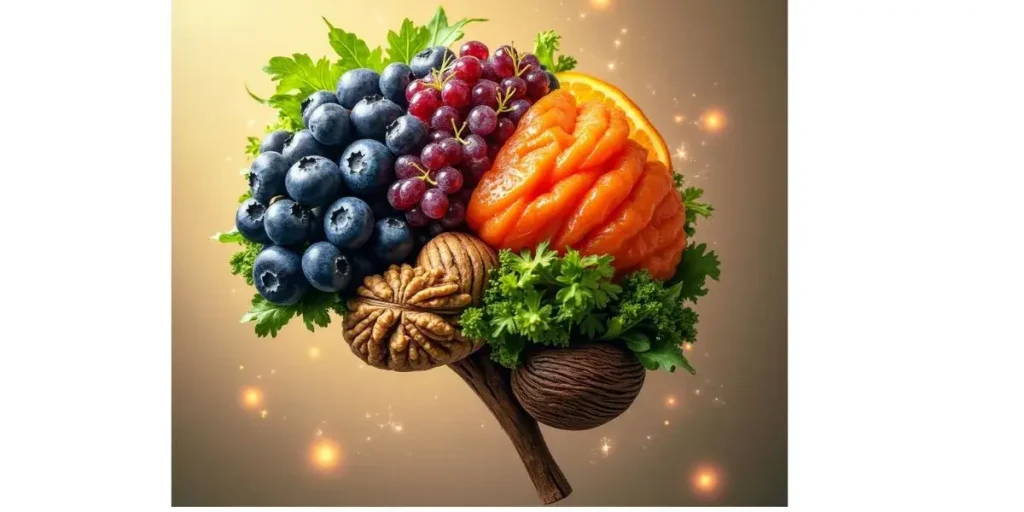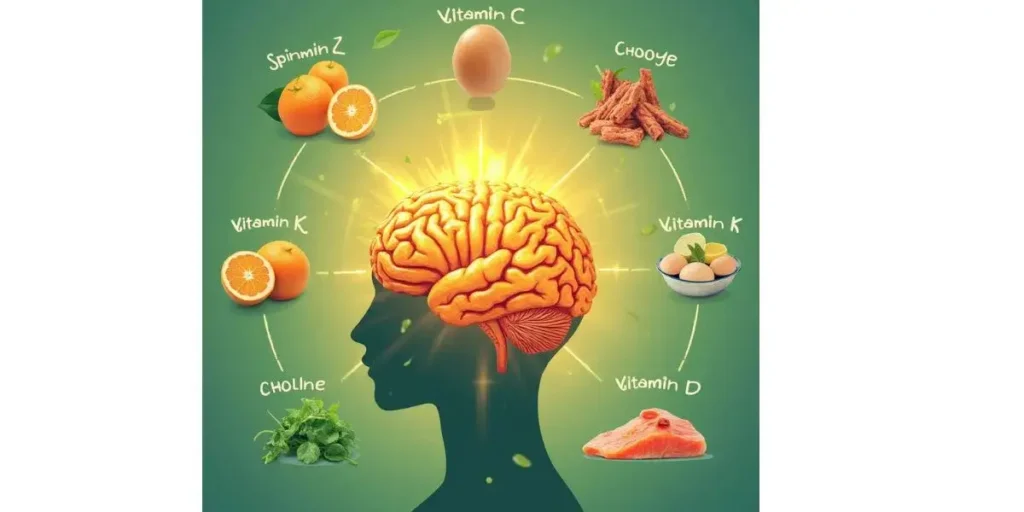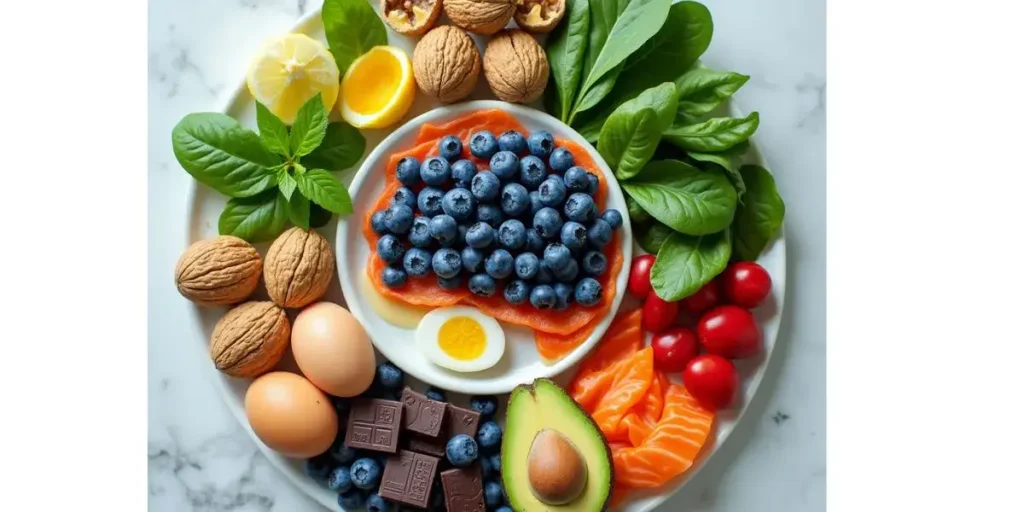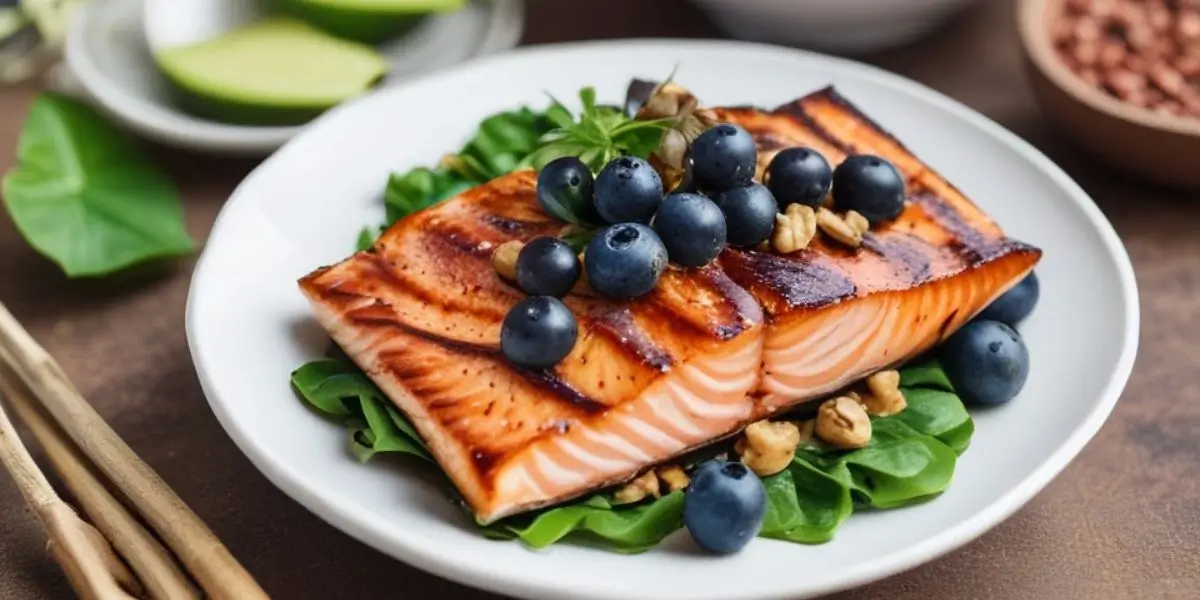Did you know that what you eat can significantly impact your brain’s performance? The 10 Top Foods for Brain Health are not just delicious but also packed with nutrients that enhance memory, focus, and overall cognitive function. From brain-boosting superfoods to everyday ingredients, these healthy foods for brain power can help you stay sharp and focused. Whether you’re looking to improve concentration, boost mental clarity, or simply nourish your mind, this guide will show you how to fuel your brain with the best. Ready to unlock your brain’s full potential? Let’s dive into the 10 Top Foods for Brain Health and start eating smarter today!

Quick Links
What You'll Find in This Guide
The Role of Vitamins in Brain Health
Our brains are constantly at work, processing information, controlling bodily functions, and regulating emotions. To function at their best, our brains require a variety of vitamins and nutrients to fuel their complex processes. Vitamins are organic compounds that the body needs for proper functioning, but they cannot be synthesized internally. This means we must obtain them through food or supplements.
Several vitamins are essential for maintaining optimal brain health, including B vitamins, Vitamin D, Vitamin C, and Vitamin E. Each of these vitamins contributes to various aspects of cognitive function, from memory and focus to mood regulation and stress reduction.
- B Vitamins: The B vitamin group, including B1 (thiamine), B6 (pyridoxine), B9 (folate), and B12 (cobalamin), is essential for maintaining brain health. These vitamins are involved in the synthesis of neurotransmitters, such as serotonin and dopamine, which regulate mood, focus, and memory. Deficiencies in these vitamins have been linked to mental fatigue, depression, and cognitive decline.
- Vitamin D: commonly called the “sun vitamin,” serves vital functions in maintaining cognitive health. This nutrient influences brain development and neural communication by promoting the growth of neurons and supporting neuroplasticity. Additionally, Vitamin D aids in balancing neurotransmitter levels, such as serotonin, which is linked to emotional stability and happiness. Insufficient levels of Vitamin D are associated with an increased risk of mood disorders, including depression, making it a crucial nutrient for mental wellness.
- Vitamin C: Known for its immune-boosting properties, Vitamin C is also an antioxidant that protects the brain from oxidative stress. Oxidative stress can damage brain cells and is linked to age-related cognitive decline. Vitamin C helps combat this damage by neutralizing harmful free radicals, supporting overall brain health.
- Vitamin E: Another powerful antioxidant, Vitamin E protects the brain from oxidative damage and promotes cognitive function. Studies suggest that Vitamin E can help prevent memory loss and support overall brain health, particularly in older adults.

Healthy Foods for Brain Power
Now that we understand the essential role vitamins play in brain health, let’s take a look at some of the best foods that are rich in these vital nutrients. By incorporating these foods into your daily diet, you can support your brain’s function, improve mental wellness, and enhance cognitive performance.
1. Fatty Fish (Salmon, Mackerel, Sardines)
Fatty fish are packed with omega-3 fatty acids, which are crucial for brain health. Omega-3s play a key role in building brain cells and supporting communication between neurons. They have also been shown to improve memory, focus, and mood. Salmon, mackerel, and sardines are excellent sources of omega-3s and also provide Vitamin D, which helps support brain function.
2. Leafy Greens (Spinach, Kale, Swiss Chard)
Leafy greens, such as spinach, kale, and Swiss chard, are nutritional powerhouses packed with compounds that support brain health. They are abundant in essential vitamins like Vitamin K, which helps with neural function and cell maintenance, and Vitamin C, a potent antioxidant that combats oxidative stress. Additionally, these greens are a rich source of folate, a B vitamin critical for maintaining cognitive sharpness and preventing mental sluggishness. Regularly incorporating leafy greens into your diet can enhance memory, boost concentration, and protect the brain from the effects of aging.
3. Berries (Blueberries, Strawberries, Blackberries)
Blueberries stand out among brain-friendly foods due to their high levels of antioxidants and anti-inflammatory compounds. These tiny berries are particularly effective at supporting communication between neurons, enhancing the efficiency of brain cell signaling. Additionally, their bioactive compounds help reduce inflammation in the brain, which is linked to improved cognitive function and a lower risk of neurodegenerative conditions. Regularly enjoying blueberries can sharpen memory, improve focus, and provide long-term protection for your brain.
4. Nuts and Seeds (Walnuts, Almonds, Flaxseeds, Chia Seeds)
Nuts and seeds are packed with Vitamin E, a powerful antioxidant that shields brain cells from oxidative stress and damage. Walnuts, in particular, are a great source of omega-3 fatty acids, which support cognitive function. Almonds and flaxseeds are rich in Vitamin B6, which is essential for brain development and function. Incorporating a variety of nuts and seeds into your diet can help improve mental clarity and cognitive performance.
5. Whole Grains (Oats, Quinoa, Brown Rice)
Whole grains are an excellent source of complex carbohydrates, which provide a steady supply of energy to the brain. They are also rich in B vitamins, particularly B1 (thiamine) and B3 (niacin), which support brain function and help improve concentration and focus. Consuming whole grains regularly can help improve mental stamina and prevent cognitive fatigue.
6. Eggs
Eggs are a powerhouse of nutrients, providing high-quality protein, Vitamin B12, and choline. Choline is essential for producing acetylcholine, a neurotransmitter vital for learning and memory processes. Eggs are also rich in Vitamin D, which supports brain function and mood regulation.

The Psychological Benefits of Eating Vitamin-Rich Foods
Eating a diet rich in vitamins and nutrients not only supports physical health but also has profound psychological benefits. The foods that boost brain health are essential for maintaining mental wellness, improving mood, and reducing stress. Here’s how vitamin-rich foods can have a positive impact on your mental state:
1. Improved Mood and Mental Wellness
Certain vitamins, particularly B vitamins, and Vitamin D, are involved in the production and regulation of neurotransmitters that affect mood. For example, Vitamin B6 is necessary for the synthesis of serotonin, a neurotransmitter that promotes feelings of happiness and well-being. Adequate Vitamin D levels have been linked to a lower risk of depression, while omega-3 fatty acids have been shown to reduce symptoms of anxiety and improve overall mood.
2. Reduced Anxiety and Stress
Many of the foods that boost brain health also help to reduce anxiety and stress. Omega-3 fatty acids found in fatty fish, for example, have been shown to decrease inflammation in the brain, which can contribute to feelings of anxiety. Additionally, B vitamins and Vitamin C help regulate the body’s stress response and improve the ability to cope with stress.
3. Enhanced Focus and Cognitive Function
Vitamin-rich foods that are high in antioxidants and omega-3 fatty acids can improve mental clarity and focus. Studies have shown that antioxidants, such as those found in berries and leafy greens, help protect the brain from oxidative stress and inflammation, both of which can impair cognitive function. Omega-3 fatty acids, which are abundant in fatty fish and nuts, have been shown to improve memory, learning, and concentration.

Simple Ways to Add Brain-Boosting Foods to Your Daily Diet
Incorporating brain-boosting foods into your daily meals doesn’t have to be complicated. Here are a few simple tips to help you get started:
- Start your day with a brain-boosting breakfast: Include whole grains, such as oats or quinoa, along with berries or a handful of nuts for a balanced, nutrient-rich start to your day.
- Snack on nuts and seeds: Keep a small handful of almonds, walnuts, or flaxseeds on hand for a brain-boosting snack between meals.
- Include leafy greens in your meals: Add spinach or kale to smoothies, salads, or omelets for an easy way to incorporate more brain-healthy nutrients into your diet.
- Eat fatty fish regularly: Try to include fatty fish, such as salmon or mackerel, in your meals at least two to three times per week.
- Experiment with new recipes: Try new recipes that incorporate brain-boosting foods, such as berry smoothies, quinoa bowls, or salmon salads, to keep your meals interesting and nutritious.

Incorporating vitamin-rich foods into your diet is an excellent way to enhance brain health and mental wellness. From leafy greens to fatty fish, these nutrient-packed options provide the essential vitamins and minerals needed to boost cognitive function, improve mood, and reduce stress. However, mental well-being isn’t just about brain health; it also involves managing anxiety and finding calm in daily life.
To complement the benefits of brain-boosting foods, consider adding anxiety-reducing ingredients like magnesium-rich leafy greens, probiotic-packed fermented foods, and omega-3 sources like salmon and walnuts. These foods not only promote a calmer mind but also support overall well-being. For more tips and recipes to reduce anxiety naturally, check out our guide on Top Foods to Reduce Anxiety.
For further reading, explore resources like Harvard Health insights on nutrition and mental health or the National Institute of Mental Health (NIMH) for expert advice on managing anxiety and improving mental wellness through a balanced diet.
Take control of your mental health today by nourishing your body and mind with the right foods. Every bite can bring you closer to a healthier, happier life.
What are the top 5 brain foods?
Top 5 Brain Foods:
Fatty Fish (like salmon) – Rich in omega-3s for brain health.
Blueberries – Packed with antioxidants to protect the brain.
Walnuts – High in healthy fats and vitamin E for cognitive function.
Broccoli – Contains antioxidants and vitamin K for brainpower.
Dark Chocolate – Boosts focus and mood with flavonoids and caffeine.
Tip: Add these to your diet for better memory, focus, and overall brain health!
Which is the best super food for the brain?
Fatty Fish: Rich in omega-3 fatty acids, particularly DHA, which is crucial for brain health. Examples include salmon, mackerel, and sardines.
Blueberries: Packed with antioxidants, particularly flavonoids, which may delay brain aging and improve memory.
Turmeric: Contains curcumin, which can cross the blood-brain barrier and has anti-inflammatory and antioxidant benefits.
Broccoli: High in antioxidants and vitamin K, which is believed to support brain health.
Pumpkin Seeds: Contain antioxidants and a rich source of magnesium, iron, zinc, and copper, all of which are important for brain health.
Dark Chocolate: Contains flavonoids, caffeine, and antioxidants. The flavonoids in chocolate are thought to improve memory and slow down age-related mental decline.
Nuts: Especially walnuts, which are high in DHA, a type of Omega-3 fatty acid. Nuts also contain antioxidants and vitamin E, which protect cells from oxidative stress.
Oranges: High in vitamin C, which is key for preventing mental decline and supporting overall brain health.
Eggs: A good source of several nutrients tied to brain health, including vitamins B6 and B12, folate, and choline.
Green Tea: Contains caffeine and L-theanine, which can improve brain function, including memory, focus, and alertness.
Avocados: Rich in healthy monounsaturated fats, which support brain health by promoting healthy blood flow.
Whole Grains: Provide a steady supply of energy to the brain, thanks to their low glycemic index and high fiber content.
What three foods fight memory loss?
Fatty Fish: Rich in omega-3 fatty acids, fatty fish like salmon, mackerel, and sardines are excellent for brain health. Omega-3s are essential for building brain and nerve cells, and they may help improve memory and reduce the risk of cognitive decline.
Blueberries: Packed with antioxidants, blueberries can help protect the brain from oxidative stress and inflammation, which are linked to brain aging and neurodegenerative diseases. Some studies suggest that blueberries can improve memory and cognitive function.
Turmeric: This bright yellow spice contains curcumin, a compound that has been shown to cross the blood-brain barrier and has anti-inflammatory and antioxidant benefits. Curcumin may help improve memory and stimulate the production of new brain cells










1 thought on “10 Top Foods For Brain Health To Enhance Memory And Focus”